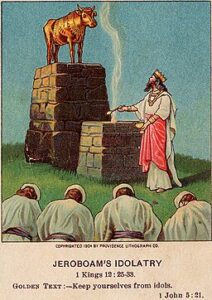“But I still have something against you because of that woman Jezebel. She calls herself a prophet, and you let her teach and mislead my servants to do immoral things and to eat food offered to idols” (Revelation 2:20 CEV).
Unlike the false teaching that was being peddled in Thyatira, a genuine message from God will never lead people away from the truth as found within the Biblical Scriptures. Of course, this requires us to know what the Bible teaches in order to distinguish between those who are promoting Biblical truth and those who are not. Therefore, we would do well to familiarize ourselves with God’s Word by reading a portion of it each day. This will enable us to measure the truth and accuracy of those ideas, beliefs, and opinions we encounter from others.
 This passage also references the sin of idolatry. We can define an idol as anything that takes the place of God in someone’s life. Once something becomes more important than God in our lives, that thing (whatever it is) effectively becomes our “god.” For instance, the person for whom money is
This passage also references the sin of idolatry. We can define an idol as anything that takes the place of God in someone’s life. Once something becomes more important than God in our lives, that thing (whatever it is) effectively becomes our “god.” For instance, the person for whom money is the most important thing in life is just as guilty of idolatry as the person who worshipped before a human-crafted statue in the Old Testament era.
the most important thing in life is just as guilty of idolatry as the person who worshipped before a human-crafted statue in the Old Testament era.
Since idolatry violates God’s first commandment, those who spread such teachings in His name cannot be true prophets of God, no matter what they may assert for themselves. Taken together, these things lead us to conclude that the message promoted by Jezebel of Thyatira was wrong, for her “prophetic” doctrine conflicted with the established Word of God.
However, Jesus was now about to deal with this so-called prophet…
“And I gave her time to repent of her sexual immorality, and she did not repent” (Revelation 2:21).
When God exercises patience with people who engage in Biblically inappropriate behaviors (such as we see here), those who are involved in such things may think, “There must be nothing wrong with my conduct. God must not be concerned with this area of my life because nothing bad has happened to me.” Others may believe that just because God hasn’t acted in a situation, it means that He is incapable of doing so.
Then there are those who freely indulge their sinful inclinations because they’ve convinced themselves that God doesn’t really exist. In fact, the Bible speaks about these attitudes when it says, “Because God does not punish sinners instantly, people feel it is safe to do wrong” (Ecclesiastes 8:11 TLB). That is a dangerous presumption, as we’ll learn next.
Image Credits: Free Clip Art, CC BY-SA 4.0, via Wikimedia Commons, and the Providence Lithograph Company, Public domain, via Wikimedia Commons

